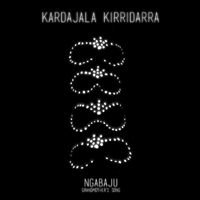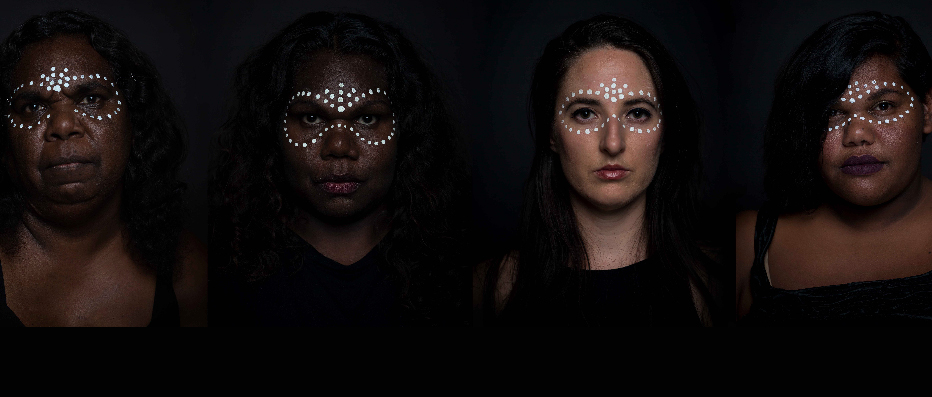KARDAJALA KIRRIDARRA – MODERN MUSIC FROM AN ANCIENT LAND
By Steve 'Habibi' Kelk
The first thing one notices when Kardajala Kirridarra take the stage is the calm, serene and confident vibe that emanates from these strong women of the desert. In traditional face paint, these artists give the audience a sense of knowing their country – knowing they are an important part of their country’s story and of being connected with their land and their ancestors, drawing on those things to keep culture alive and strong – and now their music is available for all to hear on their debut self-titled album.
The album ‘Kardajala Kirridarra’, released July 7, is a masterful commingling of traditional and modern song in several senses – lyrically, stylistically, linguistically and in production and performance. Traditional language is mixed with English and rhymes are spun here and there by the youngest of the troupe, giving broad appeal across a generational and cultural range. There is something for everyone in Kardajala Kirridarra’s songs and those open to it will find a spirituality and femininity rarely heard in the mainstream – Karajala Kirridarra’s music is empowering of women’s roles as creators, from being young girls through to motherhood and grandmotherhood – the foundation of Indigenous communities and the glue that keeps communities together. In particular, the first single from the album, Ngabaju (Grandmother’s song), tells in both Mudburra and English of the strong connection between Aboriginal women and country as a reminder about the importance of women as creators.
When I write my songs and especially the ones that I wrote for Kardajala, they have come from country. On a spiritual level, I have felt into the feelings from the feminine energy of creation. – Eleanor Dixon
Kardajala Kirridarra was formed after songwriter-vocalist Eleanor Dixon (of Rayella and Desert Divas fame) met Melbourne electronic producer, multi-instrumentalist and vocalist Beatrice Lewis at a multimedia program run by the Barkley Regional Council to document the stories and social issues of young people living in the remote Barkley region of the Northern Territory. They were later joined by translator, poet and story-teller Janey Dixon (Eleanor’s auntie) and rapper MC Kayla Jackson. The three Indigenous women of the four-piece group are from the communities of Marlinja and Kulumindini (Elliott) in the NT’s Barkley region – Kardajala Kirridarra translates to ‘Sandhill Women’, with Kardajala being the name of the mysterious bush woman ancestor from the sand hills behind the Marlinja community.
The album ‘Kardajala Kirridarra’ was recorded primarily in the heat of a hall in the community of Marlinja and produced by Beatrice Lewis. It features sounds from the surrounding lands, such as seedpods, thunder storms and clap sticks made by Eleanor’s father and was mixed and mastered in Melbourne by Marc Peckham (DJ Monkey Marc) who also co-produced. The organic features of the album blend well with the electronica and only add to the sense of generation spanning and to the accessibility of the music. Very chill and cerebral stuff, this is story-telling with a difference – Tourism NT would do well to take note of the potential positive effect of this music on would-be visitors to Central Australia.
 Band founder and main songwriter Eleanor Dixon was a well-accomplished artist before Kardajala Kirridarra, having performed all over the country with her father in the duo Rayella, who have played with orchestras and have supported the Violent Femmes on their recent Australian tour. Kardajala Kirridarra won an NT Song Of The Year award in 2016 for Abala Balawa (Everything Was At Peace). The band has since performed at several festivals, including Barunga Festival, Bush Bands Bash, Desert Harmony Festival and Wide Open Space Festival.
Band founder and main songwriter Eleanor Dixon was a well-accomplished artist before Kardajala Kirridarra, having performed all over the country with her father in the duo Rayella, who have played with orchestras and have supported the Violent Femmes on their recent Australian tour. Kardajala Kirridarra won an NT Song Of The Year award in 2016 for Abala Balawa (Everything Was At Peace). The band has since performed at several festivals, including Barunga Festival, Bush Bands Bash, Desert Harmony Festival and Wide Open Space Festival.
Foldback Magazine has been fortunate to officially attend several performances of both Rayella and Kardajala Kirridarra (most recently at Wide Open Space Festival 2017 outside Alice Springs). Kardajala Kirridarra have also been touring around the NT on the debut album and are due to play at BIGSOUND 2017 in Brisbane this September. We put some questions to Eleanor about her music and inspirations:
FM: What inspires you the most when you are writing songs? How important is country to your songwriting?
ED: When I write my songs and especially the ones that I wrote for Kardajala, they have come from country. On a spiritual level, I have felt into the feelings from the feminine energy of creation.
FM: Are all the members of Kardajala Kirridarra involved in the songwriting process? What special thing does each member contribute to songwriting?
ED: I have come up with the story line of each song. Aunty Janey helped with the translation. Beatrice has co-written one of the songs and Kayla writes the rhymes.
FM: How has having Beatrice and Monkey Marc involved been good for Kardajala Kirridarra?
ED: Well they’ve helped to mould the outer surface of the sound that you are hearing now from our music. They’ve felt and connected to the essence of what it is that we needed to get out through feelings. They are the blessings that were sent to us.
FM: When did you start singing? Where do you think your gift for singing comes from? We have seen you perform as Rayella with the Violent Femmes and at Wide Open Space as Kardajala Kirridarra – you all have beautiful voices!
ED: I started singing when I was very young, about four years old in a church at home in our community. My gift of sound and music comes from something greater than what I am as a human. I am a spiritual person in this world and I have always known that I had to sing and let songs come through feeling connected to the things that couldn’t speak for themselves…like the trees and waters…we call them ngurramarla in my language which means ‘keepers of the country’.
FM: Tell us about the recording and production process for the new album – how long did it take to produce and what problems did you have to overcome – distance, language, that sort of thing.
ED: Well with the recording side of things, of course there were challenges that we all had to face. We recorded for days in the heat. We travelled to and from places a lot. The language part was easy. The most challenging was the distance. We’d travel to Tennant Creek then back to Elliott and/or Marlinja so for Beatrice it was a long journey always but we always had bush medicine and lalija (tea) ready for her when she came home.
FM: Why did you choose Ngabaju as the standout single from the album? What about that song is special to you and the other members of Kardajala Kirridarra?
ED: That song is about our grandmother. Ngabaju means my father’s mother. So I wrote that song for my ngabaju because she played a big role in my life as all grandmothers do but we all thought that it would be a blessing to their spirits to be able to acknowledge that we are the young women we are today because of them.
FM: How is the tour going? Where have you been?
ED: We’ve played in six communities including Elliott, Tennant Creek, Ali Curung and also in Alice Springs. We’ve toured for two weeks in June and it’s been a beautiful trip, connecting to neighbouring language groups.
FM: What plans does Kardajala Kirridarra have for the near future? Any further recording, touring etcetera?
ED: Well we have BIGSOUND that we’re doing in September and we have more collaborations down the line.
‘Kardajala Kirridarra’ is available on iTunes and Spotify.







Leave a comment